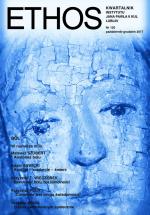 zobacz powiększenie | DOI 10.12887/30-2017-4-120-16 Sławomir BOBOWSKI – The Pain of Not Hearing God, and the Pain of Weakness: Silence, or Martin Scorsese’s Most Important Confession Cena brutto: 7,00 PLN za szt. |
|
Man’s complaint about the silence of God, about the impossibility of hearing His voice, and thus about His alleged absence, has been ever-present in history. It has been accompanied by man’s lament over his own weakness and, above all, over his propensity for falling and sin. Both these lamentations have been convincingly expressed in Shusaku Endo’s novel Silence, as well as in its film adaptation made by Martin Scorsese. In the present article, I attempt to show the immersion of the novel, as well as of the movie, in a broadly understood Christian tradition of theology and philosophy (encompassing the Bible, as well as the writings of the Church Fathers), in the literary tradition (e.g. in Fyodor Dostoevsky’s works) and in certain currents of filmmaking (begun earlier by e.g. Ingmar Bergman or Scorsese himself). However, I emphasize the religious, or rather confessional dimension of both works I discuss, in particular of Scorsese’s movie. In fact the director himself called Silence his most important film. My main thesis is that despite Scorsese’s overt and sorrowful statement expressing the ‘pain of not hearing God’ and the ‘pain of weakness,’ the movie manifests his faith in Christ and his love for Him. Silence is Scorsese’s first open and clear declaration of faith. Keywords: faith, uncertainty, weakness, suffering, art, beauty Contact: Zakład Teorii Kultury i Sztuk Widowiskowych, Instytut Filologii Polskiej, pl. Nankiera 15, 50-149 Wrocław, Poland E-mail: slawbob@wp.pl; slawomir.bobowski@uwr.edu.pl Pliki do pobrania: » 120_Bobowski.pdf | |
